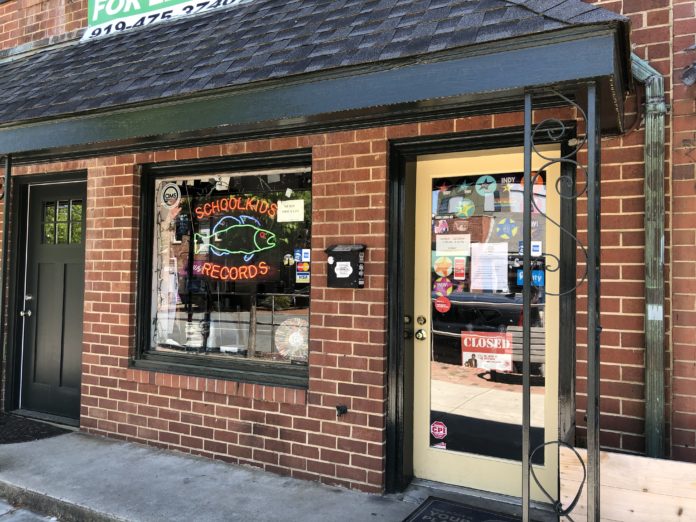
By the middle of March, the state and country had begun to take extra precautions to stop the coronavirus from spreading, and shows were getting cancelled at venues like the Cat’s Cradle and Local 506, while businesses and record stores were being shut down.
Many workers and families have been affected by the coronavirus and have lost their jobs and main source of income. Musicians and artists have had to cancel or postpone their tours, leaving them out of jobs and venues empty.

Local musician Skylar Gudasz released her album, Cinema, on April 17 with the local record label Suah Sounds and noted the difficulties of releasing the album during the quarantine.
The virus has affected the main way that musicians are able to make money and promote their music, which is by playing shows.
“Without shows, you can’t sell tickets or reach audiences to sell records, so that has been an adjustment,” Gudasz said.
There have been other changes to publicity because some radio stations are closed, eliminating certain promotional opportunities on the radio.
“Every artist I know is in the same boat. No one knows when tours will pick back up. Many of the festivals that are the big anchor shows financially for bands will be cancelled,” she said. “We are all struggling, but we are all in it together so there is a camaraderie.”
Gudasz partook in a live stream to raise money for the Durham Artist Relief fund with the Pinhook and Northstar Church of the Arts. Many artists from the Triangle area performed 20 minute sets, including Sylvan Esso and Molly Sarlé.
Gudasz also has upcoming live streams to celebrate her album release.
“A lot of people are more tuned into supporting artists right now, and a lot of people are even more connected digitally than usual, so there is an opportunity to reach them via digital avenues,” Gudasz said.
Michael Venutolo-Mantovani, one of the owners of Suah Sounds, said that, since his label is smaller and doesn’t have as many musicians releasing albums or touring right now, the label has been able to manage its losses. He is also working on a compilation right now to help aid service industry workers in the Triangle.
“If anything, people are streaming our music more, as they’re stuck at home; thus the digital realm seems to be having a bit of a mini-boom, at least for me,” Venutolo-Mantovani said.
To take extra precautions, he is trying to avoid the post office as much as possible, and, as an apology, the label is offering customers who buy a physical product a free digital download of another album of their choice from the label’s catalog.
To help artists with their losses, the streaming service Bandcamp gave artists 100 percent of their sales on March 20, and many record labels waived their label cut of purchases on that day as well.
Record labels have also been providing customers with discounts on records when they are shopping online, including the Durham-based record label, Merge Records. The label is giving customers 15 percent off when they use the code “STAYHOME” when checking out.
Artists have been performing live sets on social media platforms to raise money for organizations that help food banks, research centers and more.
As artists and labels have been doing everything they can to stay safe but also provide entertainment during this time, record stores have been doing the same.
Schoolkids Records, a record shop in Chapel Hill and Raleigh, took immediate action when North Carolina called a state of emergency and closed on March 18. Both of the stores began to clean and sanitize all of the record bins, counters, computers, bathrooms and anything else customers or staff touched.
Owner Stephen Judge said when the state changed the unemployment rules, the store decided to let go of the staff, so everyone could file for unemployment, which Judge said was the best solution for everyone, including the store.
“The goal is for the store to be here so their jobs are available when this is all over. We certainly were in a position where we would not have been able to cover everyone else’s paychecks,” Judge said. “It happened very quickly, and we had to react quickly.”
The store is currently relying solely on online sales. Both stores have over 25,000 items and have seen an increase in online sales over the past few weeks, but are worried it will not be sustainable long-term.
Judge said that after 32 years of owning Schoolkids Records, the coronavirus pandemic has presented the biggest challenge he and the store have faced.
“If our online business continues and people buy from us instead of, say, Amazon, we have a chance,” he said. “That’s a really important message to get across right now, and we’re doing all we can to support other stores around the country, as well as our friends in restaurants and venues all around the community. It’s going to be a long month. Our priority is also to stay safe and healthy, as well.”
Bull City Records in Durham also moved its sales online in the middle of March. A week before the stay-at-home mandate, owner Chaz Martenstein closed the store to the public and started running backdoor pickup, delivering purchases himself and sending orders in the mail, but he is now only doing mail orders.
“While the door was still open, we actually saw pretty much the same amount of business as usual,” Martenstein said. “Once we closed the door and moved to delivery and mail order, things surprisingly stayed the same for the first week. They may have actually even picked up because people were so graciously into being supportive.”
Like Judge, Martenstein had to let go of his staff in an effort to conserve funds so that he could keep the rent, bills and taxes paid. Martenstein said that in the first week of closure, the shop made at least a month’s worth of expenses.
“It was hard to let my staff go, but I’ll rehire them when this is all over. So far people have been supportive enough that I’ve been able to keep everything mostly paid up, but I do worry as time stretches on,” he said. “I’m trying to think month to month, so I don’t get too overwhelmed.”
Martenstein has been actively keeping up on social media and strengthening the store’s online presence. The store has gone on an ordering freeze to conserve the shop’s funds, and Martenstein said a few distributors and labels closed, causing him to worry. Because of this, the store is mainly focused on selling the inventory it already has.
“Luckily, record stores are resilient and I’m stubborn, so we’ll make it to the other side of this bruised and all. The shop has been through a recession, and I worked at shops during the MP3 explosion years ago, so I’ve learned to adapt through the hard times,” Martenstein said. “This is unlike any of those times, but luckily the shop has an extremely supportive community. It’s a reminder every day of how much I love what I do and why I do what I do.”











